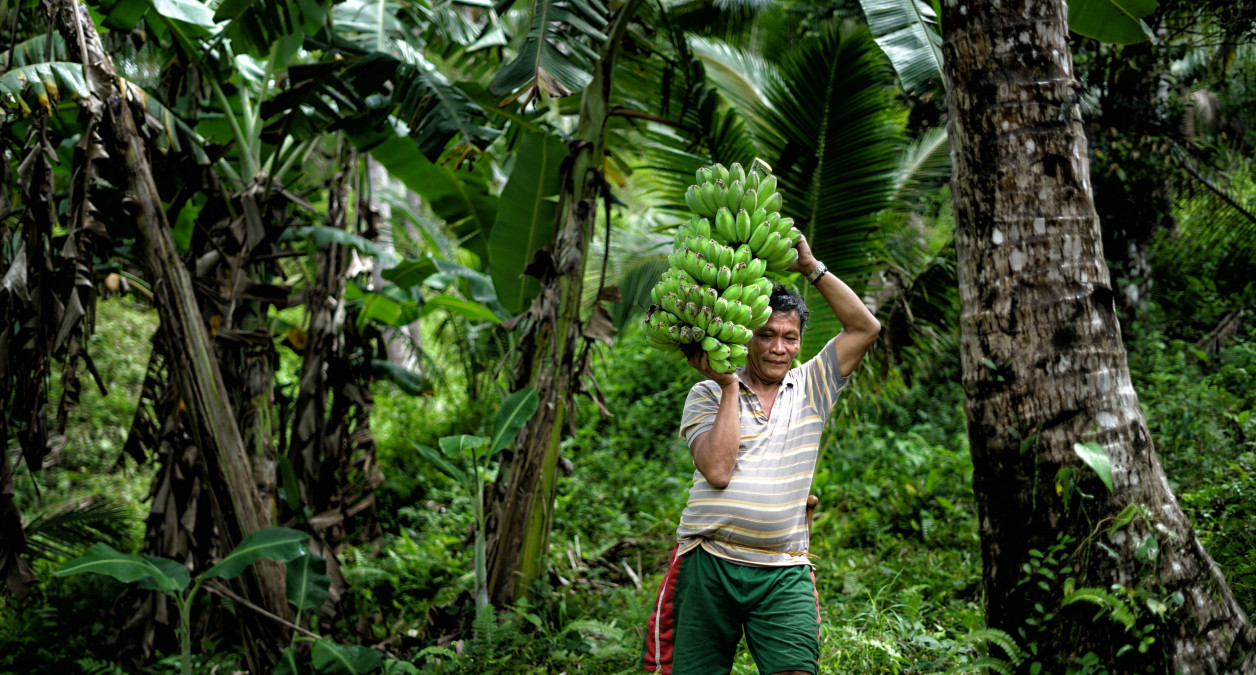Livelihood project revitalises banana industry, community in the Philippines’ Eastern Samar Province
Published: Sep 23, 2019 Reading time: 4 minutes Share: Share an articleVidal Abuda describes himself as an “ordinary farmer,” but that was before Typhoon Haiyan struck the Philippines in November 2013, devastating his main source of income. In an instant, most of Eastern Samar’s coconut trees, which can take 20 years to reach peak production, were gone, and along with them, Vidal’s livelihood. The ordinary coconut farmer was forced to reinvent himself; People in Need was there to help.

We trained Vidal and other small-scale farmers from the municipality of Quinapondan on the basics of cultivating bananas, which take just two years to mature. The program, officially the Enhancing Sustainable Income in the Philippines (ESIP) project, is funded by Swiss Solidarity and administered by People in Need and Helvetas, an Alliance2015 partner. Similar specialised trainings, with the assistance of the Department of Agriculture were provided to the Nagkakaurusa Banana Cluster – a banana farmers cooperative.
THE POWER OF COOPERATION
Because of these interventions, local banana farmers are no longer limited to selling their produce to middlemen or in the so-called “wet market,” where prices are so low that the produce might as well be given away for free. Now, growers like Vidal can sell bananas to the cluster, which in turn assists in harvesting and transportation. This added value is critical for those whose farms are in the remote highland barangays (villages) of Quinapondan, where the distance to market adds significantly to farmers’ overhead.
But the partnership is most beneficial for another reason: it helps smaller growers secure a fair price for their produce.
For instance, a supply agreement was recently facilitated between the banana cluster and Triple L Food Products, an agribusiness start-up that processes bananas into chips. The deal ensured that regional banana farmers have a regular buyer, a major challenge for most growers in the country. The agreement commits the cluster to supplying Triple L with at least 250 kilograms of fresh bananas every week at a guaranteed price of 13 pesos per kilo, as compared to the market price, which can dip as low as 10 pesos per kilo.
“We had an agreement with Triple L that we will regularly supply them bananas, and that’s the biggest help we received from the project,” says Vidal.
SUPPORTING START-UPS
Farmers are not the only ESIP beneficiaries; Triple L has also been trained on food safety processing, and in particular, how to acquire the needed operational certificates from the Food and Drug Administration. PIN and our partners also provided Triple L with technical assistance to improve their marketing strategies, ideas for enhancing their product labels and packaging, and financial management coaching to improve internal accounting. Finally, Triple L’s leadership participated in exchanges and visits to other successful enterprises to exchange management best practices.
Triple L’s leadership concedes that they were ill-equipped to run a business successfully prior to the ESIP intervention. “We were earning [money] but we didn't know where our income was going. We weren't mindful of our records, and there were too many rejects and wastes," says their general manager.
One more area that the ESIP project has focused: facilitating supply agreements between agribusiness start-ups and retailers, both within and beyond the province. The goal is to help increase sales of Triple L’s banana-based products, thereby increasing local demand for the raw material.
These efforts are paying off. Today, Triple L is supplying more than 100 retail stores and supermarkets in Eastern Samar alone. With an average monthly income of 250,000 pesos, Triple L has also been able to increase the daily wage of their production staff – from 60 pesos to 250 pesos.
What’s more, Triple L is venturing into new product lines. For instance, to reduce waste in their manufacturing process, the company is producing banana vinegar, banana polvoron, and banana pastillas from bananas rejected in chip production. The company has also been linked to microfinance institutions to access additional working capital and is in the process of expanding production capacity.
BUILDING THE BANANA VALUE CHAIN
With ESIP’s intervention in each segment of the banana value chain in Eastern Samar, the income of banana farmers in Quinapondan has grown, while their worries on where to sell their harvest have diminished. “Before, for 100 kgs of bananas, I earned an average of 600 pesos; now, it’s 800 to 1,000 pesos, just from my bananas,” says Vidal, 55, who was recently elected production manager of the Nagkakaurusa Banana Cluster. “We are not struggling as much as before …because of all the help we received. It has made farming easier. We now manage our crops better, especially bananas.”
___
The Enhancing Sustainable Income in the Philippines (ESIP) project is jointly implemented by People in Need and Helvetas, and is designed to sustainably increase the income and improve the resiliency of poor and vulnerable farmers from Eastern Samar province. ESIP is funded by Swiss Solidarity.









